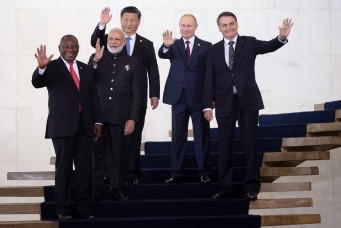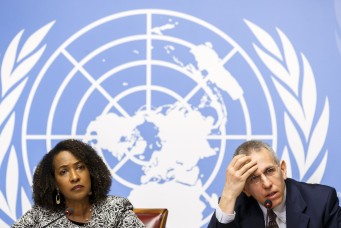How Will the Coronavirus Crisis Affect Africa’s Developmental Focus?
Mitigating the effects of the coronavirus in Africa and implementing the African Continental Free Trade Area go hand-in-hand.

Mine workers wearing face masks arrive ahead of their shift, amid a nationwide coronavirus disease (COVID-19) lockdown, at a mine of Sibanye-Stillwater company in Carletonville, South Africa, May 19, 2020. Siphiwe Sibeko/Reuters.
As governments, organizations, and individuals around the world attempt to navigate the uncharted waters of the COVID-19 pandemic, the fate of Africa and its recent development efforts are still unknown. Though the number of COVID-19 cases officially reported on the continent are low compared to the rest of the world, the question of the role of the international community and its multilateral financial institutions in helping Africa surmount the challenge it faces remains. It is clear that COVID-19 will bring a massive economic crisis worldwide; furthermore, an acute development crisis is posed to the most vulnerable economies, of which the majority are in Africa. If even the most advanced of the world’s healthcare systems have collapsed in the face of the crisis, one wonders in what state the fragile healthcare systems in Africa will emerge from the pandemic. It doesn’t help that social distancing, as largely promoted in Europe, Asia, and North America, is too complex to apply in most of Africa given African social norms, the density of population centers, and the nearly inextricable connection between the formal and informal economies, the latter of which is vast in scale and relies on direct, person-to-person interactions.
When the African Continental Free Trade Area (AfCFTA) entered into force in May 2019, the people of Africa elated and hoped that it was the dawn of a new era of interdependence in the African continent. The operationalization of the free trade area was due to begin in May 2020; but, all scheduled meetings have been postponed, and the coronavirus has put the progress of the entire AfCFTA in the near future in jeopardy.
The AfCFTA is the central platform of Africa’s development efforts in promoting its intertrade performance and the integration of its economies. But, as African governments are forced to shift their already limited capacities toward the coronavirus crisis—indeed, African countries show seriousness and sincere efforts to mitigate the crisis—little room is left for finalizing the agreement. It is incumbent upon the international community to help the African countries effectively deal with the COVID-19 crisis and prevent it from derailing the critical momentum of African development efforts, especially the materialization of the long-aspired AfCFTA.Whether the international community is ready and willing to do so will be a litmus test for whether the future will be one of international cooperation and full-scale solidarity or disintegration and total disconnect to the detriment of all.
Assessing the Brunt of the Crisis on the African Economies
Low levels of integration in the global financial markets enabled African countries to largely escape the financial crisis of 2007–2008, which was considered by many economists to have been the most serious crisis since the Great Depression of the 1930s. Such a luxury is not granted to the African continent with the coronavirus pandemic; not only does the virus know no borders, but entrenchment of global supply chains has allowed economic downturns to reverberate across regions.
Case in point are the effects of the deterioration of the Chinese economy on those in Africa, all of which have become, in varying degrees, closely interconnected with the Chinese economy via its inputs and supply chains, as well as financing of African development projects and infrastructure. For example, South Sudan and Eritrea will suffer collapsing trade and broken supply chains, as Chinese purchases account for 95 percent of all of South Sudan’s exports and 58 percent of Eritrea’s. The disruption of the Chinese market is also likely to reduce the demand for South African raw materials, including iron, manganese, and chromium ores (exports of which were worth an equivalent of 450 million euros annually). The Egyptian economy is increasingly depending on Chinese investment, as the latter has injected over $20 billion in the form of loans and development projects in the infrastructure, energy, and telecommunications sectors.
The number of confirmed cases on the continent remain small compared to the rapid spread of the coronavirus around the world, although it remains unclear if this is an accurate observation or an inaccurate perception based on Africa’s likely lack of widespread COVID-19 testing capacity. With over ninety-five thousand confirmed cases at the time of writing this paper and nearly three thousand deaths, Africa is still only at the initial phase of the pandemic of COVID-19. Unfortunately, the continent’s relatively weak health systems, extreme population densities, and large informal economies will not allow populations in Africa to respect confinement measures in the manner espoused by the World Health Organization (WHO) and advanced economies in the West. This dissonance increases the likelihood of famine in Africa. Unlike the geographically localized Ebola or Severe Acute Respiratory System epidemics, which were roughly contained and did not cause a crushing paralysis of lives and livelihoods, the slowdown in activity connected to COVID-19 will have destructive consequences on African economies, security, and social and food systems. Even the oil-producing countries, such as Nigeria and Angola, are doubly penalized by the combination of a sharp decline in global demand and price wars lowering the price of crude oil to the bottom. While much cannot be predicted about the coronavirus, one thing is for certain: Africa is going to need a great deal of help, and quickly.
For example, frequent handwashing is virtually a luxury to those who lack clean running water and struggle to get water from miles afar. Nor is social distancing realistic for marginalized societies, which are not postured to provide the mass workforce any genuine work opportunities from home. The elite or middle class staying at home and working on the Internet is very different from the situation of migrant workers and day laborers. African populations can hardly be confined to their modest lodgings, especially among the least privileged, who often live in cramped quarters with several people residing in spaces meant for far fewer inhabitants. Their lives are on the streets, interacting with each other and even sharing their belongings. Disrupting their daily lives will lead to widespread hunger and famine. Such societies cannot afford lockdowns or social exclusions that thwart their daily subsistence for survival, nor can their governments afford to come to their rescue with assistance packages.
The coexistence of generations of African people side-by-side across borders poses an obstacle to the implementation of border closures, as largely enforced by the European Union (EU) between the Schengen countries. In addition, border closures in Kenya, Nigeria, and South Africa led to violent clashes between security forces and citizens, ultimately compelling the security forces to impose a curfew from dawn to dusk.
In addition, many segments of Africa’s population suffer from preexisting health problems and perpetual anemia that render them more vulnerable to the disease. Local authorities in many countries lack the basic clinical capabilities to identify infected cases due to the absence of widespread testing capabilities. For example, Tanzania has tested only 273 out of thirty-nine thousand individuals coming from affected countries, while Germany has been able to maintain a low mortality rate due to its widespread testing system.
Furthermore, the African economies’ growth is already burdened by heavy debts, whose service alone costs more than what many countries spend on their health budgets. Africa’s debt burden of $283 billion is more than 60 percent of the gross domestic product (GDP) of its countries. African countries have very limited space in their budgets to increase their payments on health needs. They depend, for the most part, on financial aid from the developed countries. What will happen if parts of the donor surplus are divested to confront the coronavirus pandemic? This will certainly and substantially adversely affect funding to the African continent. The dual effect of the debt burden and possible aid depletion will lessen the capabilities of the African countries to confront the crisis. How can African countries obtain basic medical supplies and equipment from abroad in the face of a shortage of hard currency and the potential of lockdown to obliterate over 10 percent of the continent’s GDP, as essential sectors such as tourism, aviation, and trade slow down?
In light of these setbacks, the average growth rate of 3.4 percent forecasted for Africa in 2020 has become an illusion. Africa’s growth will drop drastically to negative rates; in reality, it will go down to between -0.8 to and -1.1 percent growth.
With about 17 percent unemployment—The African Union (AU) estimates that twenty million jobs, both in the formal and informal sectors, are threatened with destruction on the continent of 1.2 billion people—resulting from the coronavirus pandemic, Africa does not need lip service, but an inspired and full-fledged package which contains official development assistance, foreign direct investment, multilateral and bilateral debt relief, fair commodity prices and trade promotion, and emergency assistance from the International Monetary Fund (IMF). It is difficult to single out any of these options, as all are essential and should be supplied simultaneously to allow the necessary space for African governments to fight the pandemic. The package is not small. The African Ministers of Finance, in their online meeting on March 31, estimated the financial need of the African continent in the amount of $100 billion, of which $44 billion was earmarked for debt relief for all African countries. In their Communiqué, the Ministers noted that the average economic stimulus package they called for was equivalent to 0.8 percent of Africa’s GDP: one-tenth the average level of stimulus of developed countries, which stood at 8 percent of their GDP.
While governments’ highest priority is now to save lives, before long the dwindling of economies will make it clear that lives and livelihoods should go hand-in-hand, which will certainly require more financial stimulus and open markets. In an op-ed published on April 3, the IMF president and the WHO director-general made clear that the trade-off between lives and livelihoods is but a false dilemma.
Debt relief should be extended to low-income as well as to middle-income countries, having equally suffered from the economic repercussions of the coronavirus lockdown. Middle-income countries already spend over 20 percent of their revenues on servicing their debts—Egypt’s debt-to-GDP ratio is 30 percent—meaning that the expected negative growth rates will cause a negative outflow of resources of unprecedented dimensions. This will affect their abilities to increase much-needed health, education, and development expenditures.
The Central Bank of Egypt has directed local banks to delay credit dues for institutions and individuals for a period of six months without any implications. This breathing space is important to flatten the economic impact of the coronavirus outbreak and the lockdown. A similar prolonged flexibility seems to be in place for the African countries to allow a standstill of one to two years on debt repayments, including interest and principal to give them space to fight back the effects of the pandemic.
The Role of the AfCFTA in Necessitating International Solidarity
The timing of the COVID-19 pandemic is most unfortunate, as the AfCFTA was on the verge of being operationalized in May 2020. Having launched the negotiations on the AfCFTA at the AU summit in Johannesburg in 2015, the African negotiators succeeded in finalizing the agreement in record time. To date, twenty-nine out of the fifty-five AU member states have signed and ratified the AfCFTA with a view to promoting trade between themselves. The AfCFTA focuses on reducing tariffs, gradually removing nontariff barriers, and unifying the rules of origin among its member states. African countries also agreed, for the first time, to liberalize trade in services and allow service providers to compete in their respective markets. This was due to take place in five priority service sectors: financial services, transport, communications and information, business, and tourism. The agreement stipulated liberalization of the commodities by 90 percent over a five-year period, granting an extended period of ten years for the least developing countries (LDCs). The remaining 10 percent of tariff lines are between “sensitive” and “excluded” goods, which are to be released over ten years, extending the period to thirteen years for the LDCs.
As these modalities were agreed upon after extensive negotiations, the African negotiators were readying themselves to start exchanging their schedules of concessions in trade in goods and services so as to negotiate their obligations vis-à-vis one another just before the coronavirus pandemic emerged, threatening to sabotage years of progress. Scheduled meetings to end the negotiations were suspended, thus putting on hold any potential reaping of preferences. In light of the unpredictability of the repercussions of the pandemic, it may be many more years before the AfCFTA is fully effective. The agreement has been successful to date largely due to the intensive meetings held by the African countries; stopping them will have long-term negative impacts on the continuation of negotiations.
Through the AfCFTA, Africa was resolute in raising interregional trade between its members. The rate of trade exchange between African countries is the lowest among all regions, at 17 percent compared to approximately 70 percent, 45 percent, and 27 percent in the EU, Association of Southeast Asian Nations, and Latin American countries, respectively. However, with the excessive expenses needed to abate the coronavirus crisis, the African countries will have little money left to spend on the development, infrastructure, roads, and ports needed to attain their aspired target of doubling their trade over the next decade. Moreover, the mounting costs emanating from the spread of the virus, if not promptly contained, will fuel a dire humanitarian crisis and create one of the fastest-growing catastrophes in Africa. Once this happens, a drastic shift of financing from development to humanitarian focus will take place, virtually halting any progress on the AfCFTA.
Nevertheless, many are prone to believe that the AfCFTA provides us with the golden opportunity to rescue Africa from the devastating effects of the coronavirus by promoting and intensifying inter-African trade; yet, this is a fantasy. It is unfortunate to acknowledge that, because of unresolved social, economic, and political issues, the spread of the coronavirus will undermine the progress made so far in the AfCFTA, and that we will have to do without a fully-functioning continental free trade area in the near future.
African countries have acted decisively to stymie the effects of the pandemic; they were quick to create a fund to provide the necessary financial resources to combat the virus, and asked for debt relief to African countries at the extraordinary virtual summit of the G20 held in late March, drawing attention to the continent’s plight and the exorbitant costs of servicing its debt. They are capable of fighting against the coronavirus and vanquishing it. But, the anticipated severe depression in the global economy and the decimation caused by commodity price falls and lockdowns will exacerbate the situation. There is an utter need for international intervention to fight the coronavirus in Africa.
The coronavirus pandemic is a test for the international community. It spares no individual, rich or poor; young or old; man or woman; it targets everyone with no exception or mercy. The strength of our societies is equivalent to the strength of our most vulnerable citizens. Today, it is up to international financial institutions and donor countries to do their part to prevent the pandemic from reaching its tipping point in Africa.
In addition to Africa’s own efforts, the continent will need a comprehensive support package. The World Bank and the IMF must move quickly in providing emergency financing. The G20 finance ministers must ensure that African countries get the financial space required to acquire critical medical supplies; the Norwegian Refugee Council has highlighted that the Central African Republic, a country of nearly five million people, has only three ventilators in the entire country. Such a lacuna leaves the entire country vulnerable while breathing support devices are allocated to the hardest-hit coronavirus patients. Concerted action by the international community becomes a must in these dire times. It is crucial to meet Africa’s requests while avoiding ensnarement in the conditionality of the multilateral financial institutions.
The magnitude of the crisis necessitates unconventional responses to allow the defeat of the coronavirus. These measures will breathe new life into the AfCFTA, which remains at the heart of the African efforts to grow and develop. Amidst the much-needed international cooperation, Africa should not lose sight of the importance of the AfCFTA, as it continues to be the ultimate goal for the African continent. Putting the free trade area into operationalization will permit Africa to move to the next level of growth and development through promotion and diversification of trade as well as productive transformation of its economies.
It bears repeating: Africa today is a litmus test for the full-scale global solidarity and cooperation of the international community. Its success, both in vanquishing the coronavirus and implementing the AfCFTA, will be a testament to the benefits of a globalized world and a crass rejection of narrow national interests. Cooperation is still on the agenda of the world.
Magda Shahin is director of the Prince Alwaleed Bin Talal Bin Abdul Aziz Alsaud Center for American Studies and Research at the American University in Cairo.
Read MoreSubscribe to Our Newsletter





